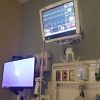The Role of Technology in Modern Cardiovascular Care
- Introduction
- Technological Advancements in Cardiovascular Care
- AI and Machine Learning in Cardiovascular Health
- Telemedicine and Remote Monitoring
- The Impact of Wearable Health Devices
- Real-World Examples of Technological Innovations
- The Future of Cardiovascular Care with Technology
- Conclusion
Introduction
In recent years, technological advancements have had a profound impact on cardiovascular care. From artificial intelligence (AI) to wearable health devices, technology is revolutionizing the way heart diseases are diagnosed, treated, and managed. These innovations not only improve patient outcomes but also make healthcare more accessible and efficient. In this article, we'll explore the role of technology in modern cardiovascular care and highlight some of the key advancements shaping the future of heart health.
Technological Advancements in Cardiovascular Care
Advances in medical technology have significantly enhanced the detection, treatment, and prevention of cardiovascular diseases. Diagnostic tools like AI-powered imaging systems and real-time heart rate monitors have helped doctors identify risks and anomalies early. Furthermore, these innovations allow for personalized treatments based on individual patient data, leading to more effective and targeted interventions.
AI and Machine Learning in Cardiovascular Health
Artificial intelligence and machine learning are at the forefront of cardiovascular care. These technologies help healthcare professionals analyze vast amounts of patient data to predict potential cardiovascular events, such as heart attacks or strokes. AI algorithms can also assist in diagnosing conditions like arrhythmias by interpreting ECGs and imaging results with greater accuracy and speed than traditional methods.
Telemedicine and Remote Monitoring
Telemedicine has become an essential tool in modern healthcare, particularly for managing cardiovascular conditions. Remote monitoring devices allow healthcare providers to track patients’ heart health in real-time, even from a distance. This has proven invaluable for managing chronic conditions like hypertension or heart failure, where consistent monitoring is crucial. Moreover, telemedicine enables patients to consult with specialists without needing to travel, increasing accessibility to expert care.
The Impact of Wearable Health Devices
Wearable devices like fitness trackers and smartwatches have gained popularity in recent years, not just for fitness but for their role in cardiovascular care. Many of these devices offer heart rate monitoring, ECG tracking, and even the detection of irregular heart rhythms. These devices empower users to take charge of their health by providing valuable insights into their heart health and allowing for early intervention if necessary.
Real-World Examples of Technological Innovations
One notable example of technology improving cardiovascular care is the use of AI in predicting heart attacks. Researchers have developed machine learning algorithms capable of analyzing ECGs to identify signs of a heart attack long before symptoms appear. Another example is the use of wearable devices to monitor patients post-surgery, ensuring that any complications are detected and addressed promptly. These real-world cases show the tangible benefits of integrating technology into cardiovascular care.
The Future of Cardiovascular Care with Technology
The future of cardiovascular care looks promising, thanks to continuous advancements in technology. From AI-driven robotic surgeries to personalized medicine based on genetic data, the next decade will bring even more innovative solutions to the table. Furthermore, as healthcare becomes increasingly digital, there will be greater opportunities for global access to cardiovascular care, particularly in underserved areas.
Conclusion
Technology has undoubtedly transformed modern cardiovascular care, offering new opportunities for early diagnosis, effective treatment, and improved patient outcomes. With innovations like AI, wearable devices, and telemedicine, the future of heart health is brighter than ever. As these technologies continue to evolve, the healthcare industry will be able to provide more personalized and accessible care for individuals worldwide. Embracing these innovations is essential to advancing cardiovascular health and ensuring that patients receive the best possible care.





















